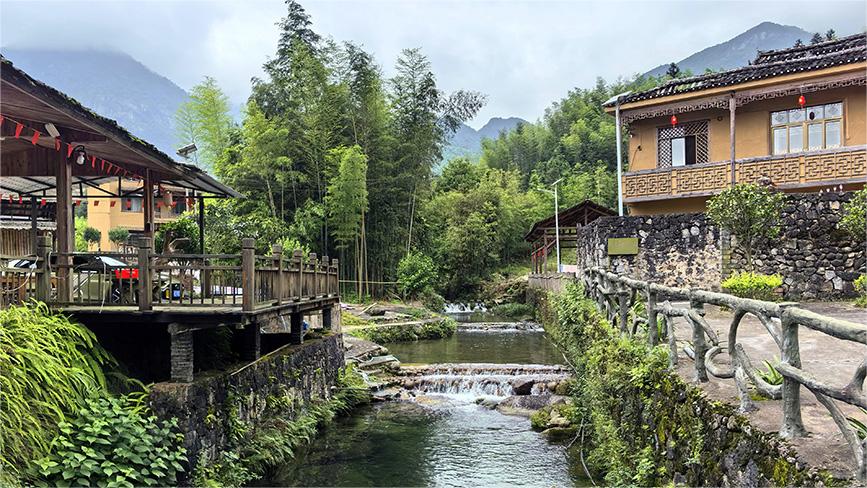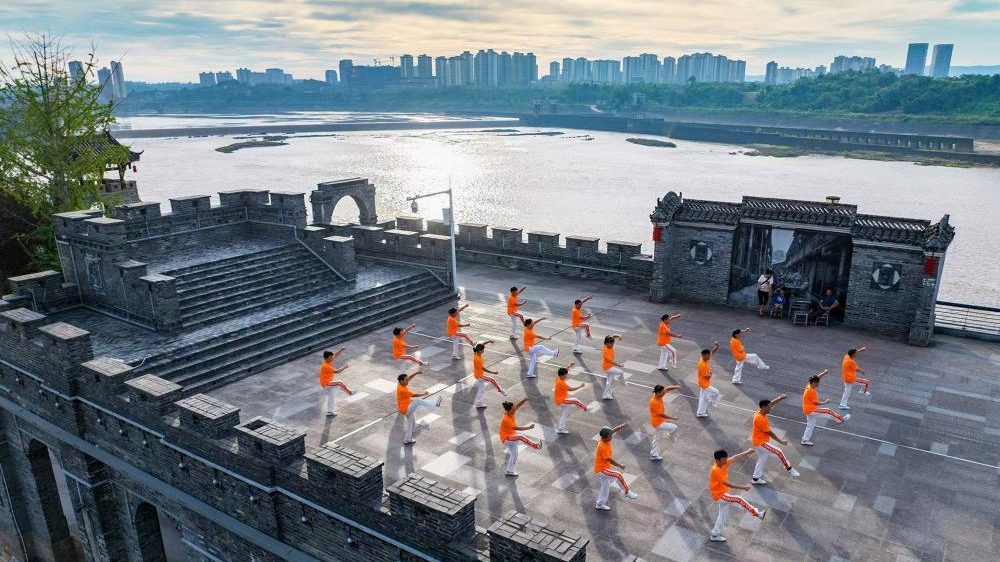Feature: Parliamentarians from developing nations tour Chinese history and modernity
TIANJIN, Aug. 26 (Xinhua) -- On field trips in Beijing, Shanxi Province and Tianjin, parliamentary leaders and representatives from 32 developing countries experienced the country's ancient architecture, traditional art and modernization.
The event was a part of the 2024 Inter-regional Seminar on the Achievement of the Sustainable Development Goals (SDGs) for Parliaments of Developing Countries, co-hosted by China's National People's Congress and the Inter-Parliamentary Union (IPU).
During their trips, the parliamentarians also had the opportunity to witness the resilience of the Chinese people and gain insights into China's astonishing development over the past 40 years, hoping to bring back Chinese solutions and wisdom to aid development back home.
FAST-PACED MODERNIZATION
Seeing is believing. During field trips, parliamentarians from developing countries learned about China's rural revitalization, intelligent mining methods, smart agriculture, among others.
"I was here about 15 years ago. I'm impressed with this significant development that is taking place in China from 15 years ago," Faizal Jaffarally, a member of the parliament of Guyana, told Xinhua in Beijing.
Botswana's House of Chiefs Chairman Puso Gaborone, who has visited China several times, told Xinhua that there have been significant changes over the years in China, including infrastructure and services development, promotion of the welfare of the people, as well as technological innovation, "which is an indication that China is growing."
"I've never seen intelligent mining," said Doreen Chibomba, director of the Social Committee of the National Assembly of Zambia, after visiting the Tashan Coal Mine in Datong, Shanxi Province.
Chibomba told Xinhua that the application of 5G and artificial intelligence in the mining system left a deep impression on her.
"The path that China is taking with these SDGs is something that I think, especially me coming from an African country, we should learn from," she said.
At the Jinzhong National Agriculture High-tech Zone Smart Farm Demonstration Base, parliamentarians listened carefully to the introduction of various agricultural products, and asked about the disease resistance feature of seeds and inquired about the use of drones in agriculture.
Binuka Sherpa, a parliamentary representative from Nepal, took notes on agricultural products and told Xinhua that she was amazed by China's automated and intelligent systems.
"Only one man is enough to control all these 10,000 square meters. That's so amazing," she said after seeing an intelligent water and fertilizer integrated machine system.
IMPRESSED BY CULTURAL HERITAGE CONSERVATION
After visiting the Ancient City of Datong, a significant cultural hallmark, Sebastien Pillay, a member of the National Assembly of Seychelles, bought two stone-lion souvenirs.
"The Chinese value culture so much that you try to protect it to the point where you keep it safe for the future generation," he said.
Gaborone said there is a "strong preservation of culture in China. The values and teachings ... have been preserved over the years and transmitted to the young ones."
The parliament representatives said it is increasingly important for the international community to jointly promote inter-civilization dialogue in the current context of multiple interconnected crises and challenges.
"A society without a culture is akin to one without a soul. Respecting the diversity of civilizations and cultures helps preserve and enrich them," said Nabwera Daraja Nabii, a member of the National Assembly of Kenya.
"China is one of the forefront countries allowing small countries, small economies, poor communities, to have their say freely and contribute to the development of the human species," said Lesotho's National Assembly Speaker Tlohang Sekhamane.
INSPIRED BY RESILIENCE
After days of field trips in China, the parliamentarians agreed that China's success did not happen overnight.
In the eyes of Richard Ravalomanana, who is the president of the Senate of Madagascar, the story of Yang Jiayao village is inspiring.
After witnessing firsthand the Shanxi village's eco-friendly living environment and high living standards and watching a video of how the village has transformed from poverty-stricken to modernized, Ravalomanana credited China's unwavering rural revitalization efforts.
"I am impressed. This is the place I want to remember," said Francis Belekanyama, a Malawian MP, after visiting music and computer classrooms at the Yangjiayao Village School.
Belekanyama told Xinhua that he could not imagine how a village could be so developed. He kept taking pictures during the trip, expecting those memories to give him "the energy to work hard and be innovative."
In the Museum of the Communist Party of China (CPC) in Beijing, the parliamentarians had the chance to learn the stories of the CPC's revolutionary traditions, deciphering how the CPC united and led the Chinese people toward ground-breaking paths.
Tulia Ackson, IPU president and Tanzania's National Assembly speaker, said that the museum taught her "how China as a nation has developed from different stages, at which point they had to defend themselves, at which point they had to really work hard."
"It's remarkable to see where China has begun with," Adrien Charles Duval, speaker of the National Assembly of Mauritius, told Xinhua after visiting the museum, adding that it is a profound learning journey to understand the challenges and the tremendous sacrifices that have marked China throughout the years.
"China is the leading country in the world in terms of innovation and the second largest economy," he said. "When you look at the CPC Museum, you really understand the challenges that China has come through...a lot of effort has been put under the CPC to drive China to where it is today."
Photos
Related Stories
- Beyond Western model: how Chinese modernization is contributing to the world
- Explainer: How did China achieve such remarkable modernization?
- Interview: China to accelerate building a fiscal system compatible with Chinese modernization
- Interview: Chinese modernization enriches global understanding of modernization, says Syrian analyst
- Commentary: China earnest, steadfast in further deepening reforms
Copyright © 2024 People's Daily Online. All Rights Reserved.









